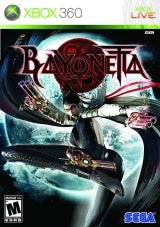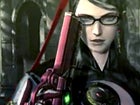In the first five minutes of Bayonetta, the titular (yeah, I know you're snickering) femme fatale -- dressed quite conservatively in an ivory-colored nun's habit -- prays quietly at a rainy graveyard. But within seconds, she shatters that tranquility and violently rips through her outfit at strategically placed zones -- breasts, legs, and ass -- to reveal a skin-tight black leather cat-suit. Before the scene ends, she's shoved her crotch in front of the camera a half-dozen times, indulged foot fetishists by strapping pistols to her high heels, sashayed around a stripper pole (uh, at a graveyard...?), and fellated a bright red lollipop. Oh, and she's bloodily eviscerated a cadre of heaven-descended angels -- but not before lining the seraphim up like a chorus line, bending them over, and spanking them from behind. And all of this while a peppy J-pop version of "Fly Me to the Moon" plays in the background.
That scene sums up the game's aesthetic and attitude quite nicely. Bayonetta goes from placid to bombastic in an instant, with no in-between. And that's no surprise, given the game's pedigree. Hideki Kamiya may have tried his hand at the whole "games as art" movement with Okami, but he's best known for the over-the-top, demon-infused Devil May Cry action series. After his run at Clover Studio ended with a series of critical-hits-as-commercial-failures, Kamiya set up shop at Platinum Games with several fellow Capcom/Clover refugees and formulated a new mission: Craft a spiritual successor to Devil May Cry... only, in his words, "sexier."
Bayonetta's witchy protagonist is definitely hotter than Devil May Cry main man Dante -- and not just for the obvious reasons. As expected, you can unleash the requisite flurries of combos, but Bayonetta adds another layer with its "Witch Time" concept, which activates when you dodge an enemy attack at the last possible second. Unlike most other variations of the slo-mo "bullet time" conceit, this one's based almost entirely on skill, which makes it all the more rewarding when you pull it off against a powerful foe.
And that gets to the core of Bayonetta's gameplay: It's tough, but (mostly) fair, and it's also incredibly frenetic and varied. Whether cruising down the highway to avoid gigantic spear-wielding angels or climbing a tower to the stars, Bayonetta's always doing something different, and never in one place for too long -- aside from one frustrating segment that plays as a far-too-drawn-out homage to the classic Sega '80s arcade shooter Space Harrier (hey, I liked the game back in the day...but not that much). But since the combat's so complex, it really demands a practice arena. During extended loading sequences, the game offers a chance to try out combos, but it's not nearly enough. Bayonetta plays out like a series of boss fights, so you simply don't have ample opportunity to practice your moves on cannon fodder (but if you really wanna just sit back and enjoy the visuals, you can always switch to Very Easy mode, which allows you to destroy even the hardest bosses without taking a scratch -- and lets you keep a hand free for what the Internet has only half-jokingly dubbed "Masturbation Mode").
And while the game offers several improvements on the Devil May Cry formula, one major issue remains -- and prevents Bayonetta from presenting a truly smooth combat experience: the camera. Yes, you'd think that in a game based around precision timing, the camera would help instead of hinder. But Kamiya will always go for the sweeping cinematic shot over the more logical, functional view. He wants you to see that gigantic seraphim boss from just the right angle, and by golly, you're gonna like it. Just think of it as the price you pay for his mad genius, just like the endless babbling you'd endure in one of Hideo Kojima's Metal Gear Solid games.
Since its release, Bayonetta's been prone to some hyperbolic descriptions (on the Internet?! No!). I've seen breathless proclamations that it's the best action game of all time (not quite) and that it features flawless controls (far from it). But just like Clover Studio's God Hand -- from which I'm convinced Kamiya took some pretty big inspiration -- it's a flawed-yet-brilliant masterpiece that deserves to be played in spite of several glaring weaknesses. After all, I might play more technically adept action games this year, but I can pretty much guarantee that none of them will revolve around summoning giant stiletto heels made out of hair.





 Good
Good




